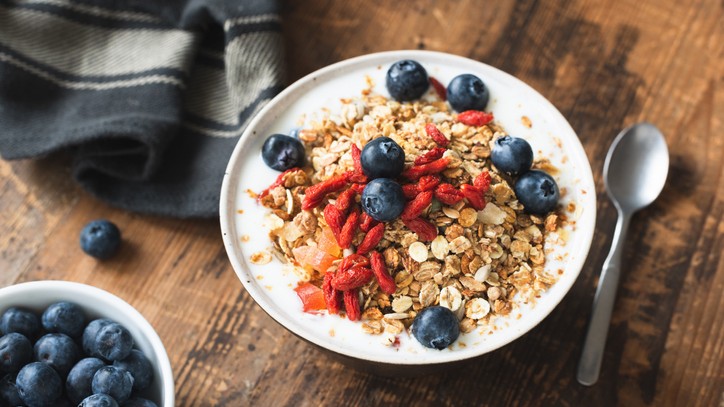What is the DASH diet?
What is the DASH diet and how can it help you to stay healthy?

Get the world’s most fascinating discoveries delivered straight to your inbox.
You are now subscribed
Your newsletter sign-up was successful
Want to add more newsletters?

Delivered Daily
Daily Newsletter
Sign up for the latest discoveries, groundbreaking research and fascinating breakthroughs that impact you and the wider world direct to your inbox.

Once a week
Life's Little Mysteries
Feed your curiosity with an exclusive mystery every week, solved with science and delivered direct to your inbox before it's seen anywhere else.

Once a week
How It Works
Sign up to our free science & technology newsletter for your weekly fix of fascinating articles, quick quizzes, amazing images, and more

Delivered daily
Space.com Newsletter
Breaking space news, the latest updates on rocket launches, skywatching events and more!

Once a month
Watch This Space
Sign up to our monthly entertainment newsletter to keep up with all our coverage of the latest sci-fi and space movies, tv shows, games and books.

Once a week
Night Sky This Week
Discover this week's must-see night sky events, moon phases, and stunning astrophotos. Sign up for our skywatching newsletter and explore the universe with us!
Join the club
Get full access to premium articles, exclusive features and a growing list of member rewards.
If you’ve been exploring different diets lately, you may have stumbled across the DASH diet and found yourself curious as to what it involves. First introduced in 1997, the DASH diet stands for 'dietary approaches to stop hypertension' (also known as high blood pressure).
High blood pressure affects nearly half of all Americans, and is defined as a systolic blood pressure greater than 130 mmHg or a diastolic blood pressure greater than 80 mmHg, according to the CDC. When left untreated, high blood pressure can cause damage to a range of organs throughout the body and may result in a heart attack or stroke.
The good news is, there are several ways that we can reduce high blood pressure. While investing in one of the best water bottles and upping your fluid intake can certainly help, the DASH diet offers a great nutrition-based way to help reduce high blood pressure without you needing to make any dramatic changes to the food you’re consuming.
Focusing on lowering the amount of sodium consumed by encouraging people to eat whole foods, the DASH diet helps people to reduce their consumption of red meat and processed foods (which tend to be high in sodium) and increase their intake of fiber and mineral-rich foods such as fruits and vegetables.
But is the DASH diet suitable for everyone? How does it work? And are there any side effects from following it? Read on to find out.
What is the DASH diet?
The DASH diet focuses on reducing consumption of red meat and heavily processed foods that are high in salt and sugar, and increasing the amount of potassium, magnesium and calcium. Potassium, magnesium and calcium are all important minerals in the regulation of blood pressure, as they play a role in the relaxation and contraction of blood vessels. In addition to this, potassium has a purging effect on the sodium in the body, so the more potassium you eat, the more sodium you lose through urine, according to the American Heart Association.
A review in the Journal of the American College of Cardiology found that lowering sodium may be beneficial for those in pre- and stage 1 hypertension (high blood pressure). The study indicated that the DASH diet can be used as a method of intervention to help lower high blood pressure and aid in preventing those with high blood pressure from developing secondary health conditions.
Get the world’s most fascinating discoveries delivered straight to your inbox.
To read more about blood pressure and how our vascular system works, check out our guide to veins and arteries: facts about our blood vessels.

What to eat on the DASH diet
Registered dietician, food therapist and nutrition consultant, Laura Clark, explains the main characteristics of the DASH diet. “It's a diet rich in fruits, vegetables, wholegrains, fish, poultry, beans, pulses, nuts, seeds and low fat dairy,” she says. “The emphasis with the DASH diet is a reduction of meat and processed foods which are higher in salt and sugar. Combining a reduction in salt with the eating of more foods that help to lower blood pressure and protect our arteries. There are no absolute cannots on this diet - it's about getting a better balance towards the foods that have been proven to help and reducing salt intake to under 6g per day.”
Increasing your intake of fruits, vegetables and whole grains, as the DASH diet recommends, will help to increase your dietary fiber intake, in turn giving you a sense of fullness and satiety when you eat. Often hunger and lack of satisfaction cause dieters to quit, so it’s important to help keep hunger low and motivation high.
- Related: 7-day DASH diet meal plan

The Journal of Nutrition investigation into the role of fiber in weight loss indicates that a diet high in fiber can help those with obesity to adhere to a calorie restricted diet. As obesity is often a condition found alongside high blood pressure, decreasing overall weight can be beneficial in helping treat the symptoms of both, and reduce pressure on the cardiovascular system.
For another healthy alternative to the DASH diet, you might want to look at the Mediterranean diet.
Potential benefits of the DASH diet
According to the CDC, only about 1 in 4 adults (24%) with hypertension have their condition under control, which is quite a scary number considering the number of people in the US who have it. Dietary changes, such as following the DASH diet, may help to keep the condition under control.
Clark explains that the DASH diet has a number of applications, although it started as a diet to help those with hypertension. “Originally designed to reduce blood pressure, it also has other benefits for cardiovascular health and has been shown to reduce the risk of stroke, heart attacks and improve cardiovascular health in general due to being rich in cardioprotective nutrients such as fiber, calcium, potassium and magnesium,” she says. “It's a healthy way of eating suitable for the whole family.”
Reducing your consumption of processed foods and opting for more whole foods can help improve your overall health, as it often correlates with a reduction of sodium, saturated fat and sugar in the diet, which can contribute to the development of high blood pressure or associated conditions.
References
Facts About Hypertension | cdc.gov. (2021, September 27). Centers for Disease Control and Prevention. Retrieved April 22, 2022, from https://www.cdc.gov/bloodpressure/facts.htm#:%7E:text=Nearly%20half%20of%20adults%20in,are%20taking%20medication%20for%20hypertension.
How Potassium Can Help Control High Blood Pressure. (2022, April 14). Www.Heart.Org. Retrieved April 22, 2022, from https://www.heart.org/en/health-topics/high-blood-pressure/changes-you-can-make-to-manage-high-blood-pressure/how-potassium-can-help-control-high-blood-pressure#:%7E:text=The%20more%20potassium%20you%20eat,80%20who%20are%20otherwise%20healthy.
Juraschek, S. P., Miller, E. R., Weaver, C. M., & Appel, L. J. (2017). Effects of Sodium Reduction and the DASH Diet in Relation to Baseline Blood Pressure. Journal of the American College of Cardiology, 70(23), 2841–2848. https://doi.org/10.1016/j.jacc.2017.10.011
Miketinas, D. C., Bray, G. A., Beyl, R. A., Ryan, D. H., Sacks, F. M., & Champagne, C. M. (2019). Fiber Intake Predicts Weight Loss and Dietary Adherence in Adults Consuming Calorie-Restricted Diets: The POUNDS Lost (Preventing Overweight Using Novel Dietary Strategies) Study. The Journal of Nutrition, 149(10), 1742–1748. https://doi.org/10.1093/jn/nxz117

Lou Mudge is a health writer based in Bath, United Kingdom for Future PLC. She holds an undergraduate degree in creative writing from Bath Spa University, and her work has appeared in Live Science, Tom's Guide, Fit & Well, Coach, T3, and Tech Radar, among others. She regularly writes about health and fitness-related topics such as air quality, gut health, diet and nutrition and the impacts these things have on our lives.
She has worked for the University of Bath on a chemistry research project and produced a short book in collaboration with the department of education at Bath Spa University.
 Live Science Plus
Live Science Plus










